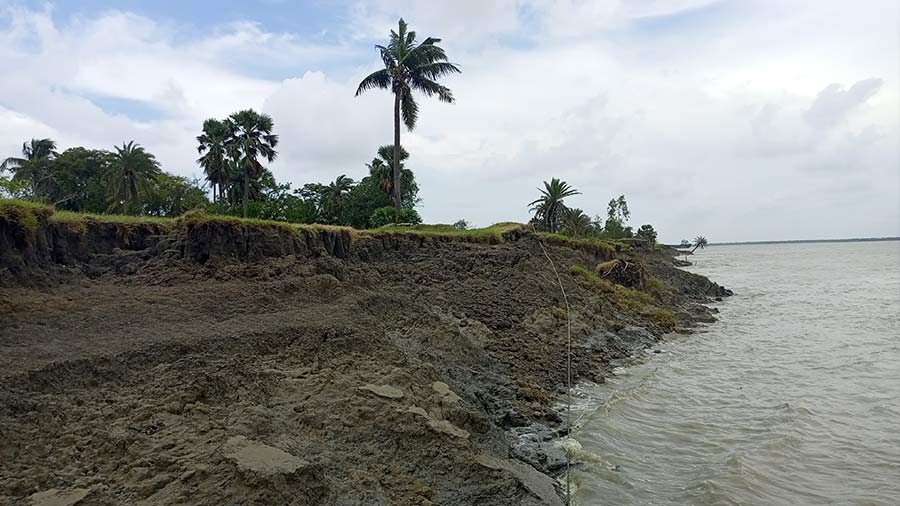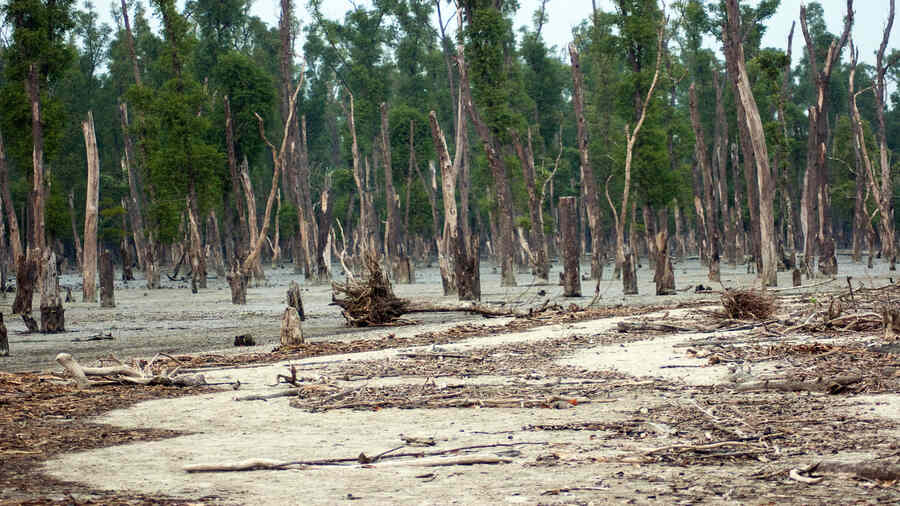Reports released on the sidelines of the ongoing UN Climate Change Summit (COP28), Dubai, have predicted that global carbon emission from fossil fuel and temperature rise will cross the levels predicted last year. Experts have pointed out that such unabated emission will impact vulnerable regions around the world, including the Sunderbans.
The Global Carbon Budget, a copy of which is with this reporter, has pointed out that the global carbon emission level from fossil fuel is set to reach an all-time high in 2023, crossing the level calculated last year. Another report confirmed that the global temperature rise, compared to the preindustrial-era benchmark, is on its way to overshooting the 1.5 degree Celsius rise accepted as a target in the Paris agreement of 2015.
The expected emission rise in India is over 8 per cent in India, one of the toppers globally but much below developed countries in terms of overall emission volume. India is responsible for over a twelfth of global emission and ranks third globally in terms of gross emission volume, though much low in the rank of per capita emissions.
India’s emission rise almost 7 times above global average; but overall low
Fossil carbon dioxide (CO2) emission is set to reach “36.8 billion tonnes in 2023, up 1.1% from 2022” , according to the Global Carbon Budget. The rise in oil emission is almost the same as coal and gas taken together, shows the data.
Overall, the global emission from oil is projected to rise most steeply in 2023, pushing back coal and gas. The report also points out that global action to cut fossil fuel and restrain climate change is too slow. Civil society groups have staged several protests at the conference venue this year, calling for cutting down fossil fuel.
The report states that “global emissions from coal (1.1%), oil (1.5%) and gas (0.5%) are all projected to increase”, and further points out that “atmospheric CO2 levels are projected to average 419.3 parts per million in 2023, 51% above pre-industrial levels”. Canada’s extremely high wildfire season has been cited as a reason for the worsening scenario.
The Global Carbon Project (GCP) report is prepared every year by a global consortium of scientists and the research team includes the University of Exeter, the University of East Anglia (UEA), CICERO Center for International Climate Research, Ludwig-Maximilian-University Munich and 90 other institutions around the world.
Emission slash reaches a plateau
The report pinned the onus on increasing carbon emission mainly on fossil fuel-linked emission and land-use change like deforestation; finds the report projecting that total global carbon dioxide emission from these two areas will be 40.9 billion tonnes in 2023.
“This is about the same as the 2022 level and part of a 10-year “plateau” – far from the steep reduction in emissions that is urgently needed to meet global climate targets,” observes the report. Scientists have repeatedly pointed out that more than 40 per cent global emission is required to be cut by 2030 to keep the global warming rise restricted within 1.5 degree Celsius — a Paris agreement target.
The Emissions Gap Report 2023, published recently, reminds that “(though) temperatures hit new highs, yet world fails to cut emissions (and) … the world is heading for a 2.5-2.9°C temperature rise above pre-industrial levels unless countries step up action and deliver more than promised in their 2030 pledges under the Paris Agreement”.
It also predicted that “2030 emissions must be cut by at least 28 - 42 per cent compared to current policy scenarios to get on track for the 2°C and 1.5°C goals of the Paris Agreement respectively”.
1.8-degree Celsius rise likely under optimistic scenario
Professor Pierre Friedlingstein of Exeter’s Global Systems Institute, who led the study, has pointed out that the impact of climate change is evident all around us, but action to reduce carbon emission from fossil fuels remains painfully slow. “It now looks inevitable that we will overshoot the 1.5°C target of the Paris Agreement and leaders meeting at COP28 will have to agree rapid cuts in fossil fuel emissions are essential even to keep the 2°C target alive,” he said.
The study warned that “at the current emissions level, the Global Carbon Budget team estimates a 50% chance global warming will exceed 1.5°C consistently in about seven years” with a rider that the “estimate is subject to large uncertainties, primarily due to the uncertainty on the additional warming coming from non-CO2 agents”.
Another report published by Climate Action Tracker vindicated the claim.
“Despite government promises, warming projections have not improved since Glasgow two years ago, amid worsening climate impacts. In a year where every continent experienced record-breaking heat, wildfires, tropical cyclones or some other extreme events, there has been no discernible shift in action,” reads the report adding that “Government 2030 targets will lead to 2.5°C of warming by the end of the century”.
The Climate Action Tracker "optimistic" scenario, which includes consideration of all announced targets in addition to the binding ones, results in warming of 1.8°C, still well above 1.5˚C.
Sunderbans set to suffer

All-time rise alert for global carbon emission will affect Sunderbans
Medha Basu“Such unabated emission rise is going to impact the vulnerable population around the world, including millions living in and around the Sunderbans in West Bengal, India and Bangladesh,” Harjeet Singh, head of Global Political Strategy with Climate Action Network International, told this reporter. “I have visited both the Sunderbans and have seen how the people are already suffering; if the emission release goes further up and temperature rise crosses the 1.5-degree Celsius limit; the population will be pushed forward to the point of no return.”
Shailendra Yashwant, a senior adviser in Climate Action Network South Asia, said “for climate change-impacted frontline communities of South Asia, from the low-lying mangroves of the Sunderbans to the mountains of Himalayas, there is bad news from COP 28 in Dubai where so far no definite pathway of emission reduction could be agreed upon and progress on global goal on adaptation continues to stagnate”.







